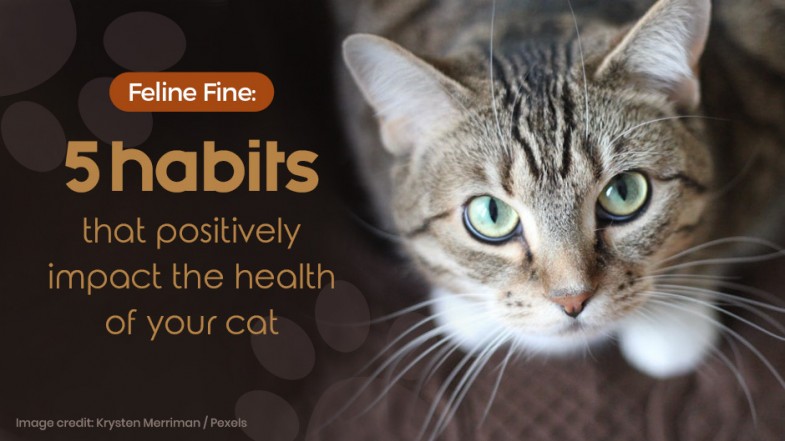Magnolia Veterinary Hospital News
Feline Fine - 5 habits that positively impact the health of your cat

Cats are wonderful pets; in fact, over 25% of US households share their home with a feline companion, according to the AVMA (American Veterinary Medical Association). They’re cute, cuddly, comical, and provide delightful companionship! But there are some things you will want to keep in mind to keep your cat's health in tip-top shape. Since August 22 is National Bring Your Cat to the Vet Day, we're sharing 5 habits that positively impact the health of your cat!
1. Feed them a healthy diet
One of the best things you can do for your cat is to feed them a healthy diet. The diet should be high in quality and be appropriate for their overall health needs. For example, we offer diets that help support dermatologic issues, weight problems, sensitive stomachs, and provide overall support for your pet at whatever life stage they are in. You will want to avoid giving your cat junk food or table scraps, which will lead to an overweight kitty and affect their health.
2. Brush their teeth
Brushing your cat's teeth is one of the easiest ways to support their health. Not only does brushing their teeth remove plaque buildup, but it also helps support healthy gums. Without brushing, periodontal disease can develop - and left to worsen, this can affect your cat's internal organs, leading to costly illnesses.
Important tip: NEVER use human toothpaste to brush your cat's teeth. There are toothpastes specifically for your feline friend, and even in flavors they'll love!
3. Provide mental stimulation
Cats have active minds and a native instinct to hunt. If these two characteristics are not addressed, you may notice destructive behaviors in your cat, or possibly even boredom or depression. Food puzzles, foraging toys (which hide food inside), scratching posts, and vertical shelving for cats to get a "birds-eye view" can go a long way in keeping their minds engaged and their bodies active and healthy!
4. Be on the lookout for behavioral and health changes
There are some signs that can indicate your cat needs attention or medical care. If your cat is showing any of these signs, bring them to see us right away:
- Changes in activity level
- Changes in their appetite
- Hiding
- Signs of pain when touched or moved
- Weight loss
It's important to note that cats are notoriously good at hiding pain and sickness, so subtle changes can help provide insight into issues that need to be addressed.
5. Remember to schedule their yearly veterinary visit
It is important that you bring your cat in for a yearly veterinarian visit. This ensures that they are up-to-date on their vaccinations and continue to get checkups to ensure that they remain healthy.
As we briefly mentioned before, cats hide illness and pain. Annual veterinary visits provide that nose-to-tail medical insight into changes that may have occurred over the past twelve months. As your cat's veterinarian, we will check their weight, administer necessary vaccinations, complete any relevant lab work, and check the health of eyes, ears, skin, and teeth.
If your cat is a senior, more frequent visits, such as two times per year, are advised. Generally, cats become seniors around age 10, according to The American Association of Feline Practitioners.
We love seeing your cat!
All in all, there are many habits that will go a long way in keeping your cat healthy. We are here to partner with you in keeping your favorite feline happy, healthy, and part of your family for as long as possible! Give us a call to schedule your cat's annual visit today!
Categories
Recent Posts

If your dog won’t stop licking, chewing, or scratching one spot, it’s natural to wonder: “Is something wrong with my pet?” While occasional itching can be common, constant attention to a single area can signal a more serious issue, such as a hot spot. These inflamed patches of skin can appear almost overnight and quickly become painful and infected without treatment.
Let’s explore what hot spots are, what causes them, and how to help your dog heal quickly.

Sunshine, open windows, and the promise of new adventures—summer road trips are hard to resist. And if you’re like many pet parents, there’s no way you're leaving your four-legged friend behind. Whether you're headed to a cabin up north, the lake for the weekend, or on a cross-country tour, traveling with pets takes some extra planning. But with a little prep, your journey can be just as smooth for them as it is for you.
Before you gas up the car and grab the treats, here’s what you need to know to help your pet stay healthy, safe, and comfortable on the road.

Think heartworm is just a summertime issue? Or that your indoor cat is safe from it? You're not alone—many pet owners have heard (and believed) myths about heartworm disease. But the truth is, this serious and potentially deadly condition affects pets in every state and can impact even those who never leave the house.
Let’s clear up the confusion and give you the real facts about heartworm—so you can protect your furry family members with confidence.